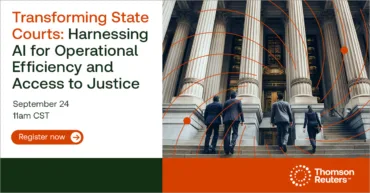Preventing fraud, waste, and abuse (FWA) is extremely important for government agencies because failing to do so can result in a loss of taxpayer money and damage to public trust. However, preventative efforts depend greatly on the availability of technological tools and personnel resources.
To better understand these needs, Thomson Reuters conducts an annual survey of state and local government employees to learn about their efforts to prevent fraud, waste, and abuse. Here are five eye-opening results from this year’s nationwide study.
1. Public records users want to spend more time on fraud waste and abuse prevention
The best way to combat fraud, waste, and abuse is to prevent it from happening in the first place. However, in 2020 COVID-19 thrust new challenges onto the nation, forcing state and local support agencies to respond by increasing their investigative work. Survey respondents reported that they spent less time on prevention efforts compared to the previous year, but they want to reverse this trend going forward. This shows that the professionals who use public records the most understand the value of preventative work.
For example, suspicious activities indicating potential money laundering, embezzlement, or irregular billing could go on for years before they are exposed and investigated. The losses incurred are not always recoverable, so working to prevent these activities is much more cost-effective than trying to deal with the repercussions after the fact.
2. Confidence in the ability to prevent fraud waste and abuse has dipped
For government program administrators, confidence hinges on how well they feel they can perform essential duties with their current resources. It’s understandable then that the events of 2020 have somewhat damaged confidence at every level. More than half of those surveyed said that they had little or no confidence in the tools and resources they had at the time to prevent fraud, waste, and abuse at state and local levels.
This dwindling confidence is likely related to the unpredictable impact of COVID-19 and remote work, two new issues that survey respondents worried about. But budget issues are also a growing concern since last year. Investing in public record tools that allow users to work more efficiently could be the key to addressing these issues and instilling new confidence in state and local departments.
3. More public records users think fraud waste and abuse will increase in the next two years
State and local government employees who use public records regularly are often the best predictors of fraud, waste, and abuse trends. When asked if they believed that their current efforts would help prevent malfeasance and criminal activity in the future. An increasing number of those surveyed said they believed the prevalence of fraud, waste, and abuse would increase in the next two years.
In fact, the percentage of state-level employees who expect increases in government fraud, waste, and abuse has doubled since last year. These are the people who are facing the brunt of FWA prevention challenges on a daily basis as the effects of COVID-19 linger. So, investing in preventative tools at this level could make the biggest difference in protecting taxpayer dollars.
4. Most small agencies don’t use any case management software or integrators in their operations
Channeling FWA prevention and investigation work through a case-management system is more efficient, and frees up time to pursue other matters. Still, almost two-thirds of survey respondents said that they do not use any sort of case-management or integrator solution to organize and manage operations.
The adoption and implementation of new technology were still the biggest challenges faced by state and local governments last year, but this was likely exacerbated by increased workloads nationwide. Many government offices are still upgrading their legacy IT systems, and the complexities of coordinating updates to state, county, and city computer networks was further complicated by the pandemic. Once modern solutions are implemented, they are much easier to use and keep up to date, which helps improve efficiency and cut costs long term.
5. Agencies leaning more on specialized tools to increase their efficiency
As state and local government agencies sought ways to meet the challenges of 2020, many turned to specialized technological solutions to improve efficiency. While disconnected government websites and free web-searching tools like Google are still commonly used, the adoption of paid public record solutions has grown in the last year. Our survey found that an increasing number of agencies relied on Thomson Reuters CLEAR to meet their needs. This cemented it as the tool of choice among industry professionals, more than any other paid solution for public records and investigations.
Get more details about fraud, waste, and abuse from our 2021 survey.










